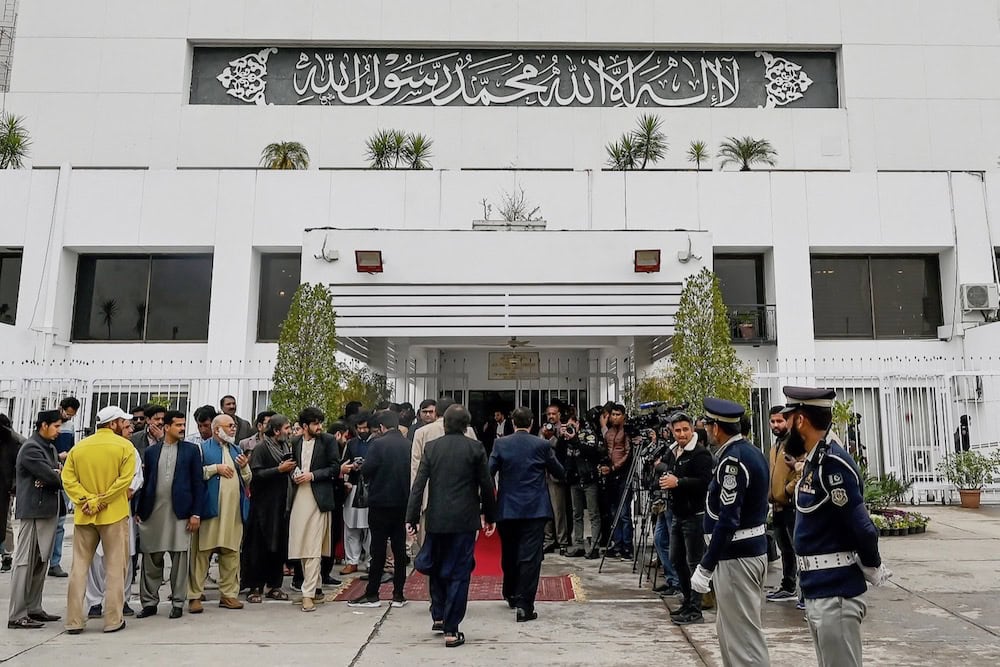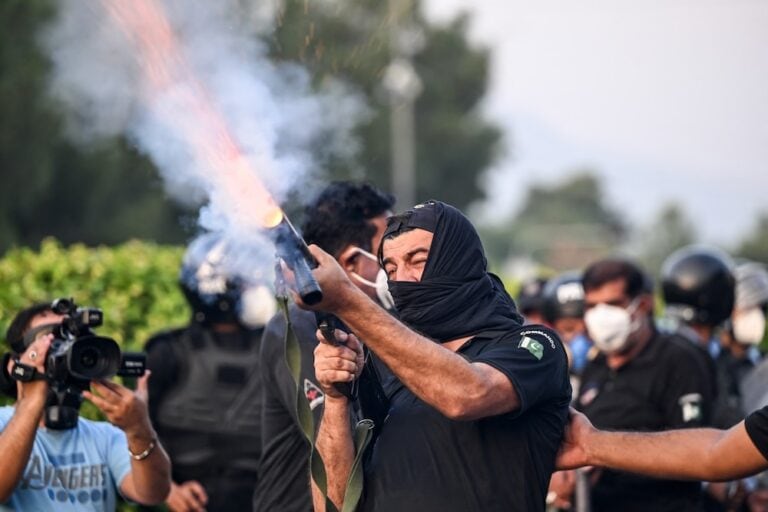IFEX is concerned about Pakistan's increasingly restrictive digital environment, particularly since the February 2024 general elections which were marred with internet and telecommunications shutdowns, and the online censorship and harassment of journalists.
1 August 2024
Ahead of the six month anniversary, IFEX, the global network of 119 member-organisations dedicated to promoting and defending the right to freedom of expression and information, is urging Pakistan’s new government and Parliament to cease the trend of developing legislative proposals and mechanisms, which have the potential to severely restrict freedom of expression, particularly online speech and privacy rights in the country.
IFEX is concerned about Pakistan’s increasingly restrictive digital environment, particularly since the February 2024 general elections which were marred with internet and telecommunications shutdowns, and the online censorship and harassment of journalists. On 17 February, social media platform X was blocked amid government concerns about growing civil unrest following allegations of rigged voting. More than five months later, the platform remains inaccessible. In this time, there have been calls to restore access to X from the public, civil society, through national court orders and notices, and by foreign governments. Although initially denying it, in March the PTA admitted that the shutdown of X was ordered by the Ministry of Interior, who then claimed to the Islamabad High Court in April, that the ban was due to national security – a measure seen under international standards as being disproportionate and often counter-productive to the aim of public security.
Challenges of Pakistan’s pending cyber legislative proposals
Against this backdrop, recent legislative proposals and mechanisms to regulate the digital environment have only added to concern. In May, the Punjab government introduced the Punjab Defamation Bill aimed at curbing the spread of disinformation across digital, traditional, and social media platforms; by June, this bill was approved by the Provincial Assembly despite draconian provisions which would target dissenters or critics of public officials, including activists and journalists. International law specifies the importance of a high threshold for criticism of public officials and discourages the use of defamation and other laws to penalize such expression. However, the new law allows for tribunals comprising a single judge to prosecute defamation against “public officials” such as high-level members of the judiciary, military, and other holders of the constitutional office; levy severe pre-trial fines of up to approximately US $10,000 immediately upon receiving a defamation claim; force resolutions to all claims within 180 days; and, in cases of a positive judgement, order an apology from the defendant and a block on their social media and other content platform accounts. The law has drawn criticism from the Human Rights Commission of Pakistan, while journalists who have filed a petition with the Lahore High Court have accused the government of passing it “in undue haste without adequate consultation”.
The speed with which this bill has been approved echoes the process for a series of problematic cyber laws that were proposed and passed at various levels in 2023, despite harmful provisions and with little input from civil society stakeholders – the eSafety Authority Bill, the Personal Data Protection Bill, and the Pakistan Electronic Media Regulatory Authority (Amendment) Bill (PEMRA).
The eSafety Authority Bill seeks to establish a regulatory authority with the power to remove, block and mandate registration of content and platforms, including social media, over-the-top platforms and video channels; imposes penalties for vaguely defined criteria such as publishing “false” news; and includes provisions on defamatory content that leave room for broad misinterpretations and risk potential misuse by authorities. Meanwhile, ambiguous terminology in the Personal Data Protection Bill (draft as of May 2023), combined with data localisation requirements and a lack of human rights safeguards, lends the bill to privacy concerns by granting government authorities greater access and discretion to monitor, control, and re-purpose user data, including for unlawful surveillance. Both bills were approved by the federal cabinet in July 2023 and can be taken up at any point in Parliament. In addition, PEMRA was initially approved at the beginning of August 2023 before being withdrawn in the days after, following protests from the journalism community. It finally passed into law in mid-August 2023 but retained problematic elements that allow for broad interpretations of “disinformation”, which could lead to increased censorship of news coverage at the discretion of PEMRA’s regulatory authority. This has been particularly concerning as following the bill’s passage into law, the lead-up to the elections saw TV channels being prohibited from airing critical voices and instructed not to air “false” information that could affect the elections or face “strict action”.
More recently, the National Cybercrimes Investigation Agency (NCCIA) was established by executive notification under the Prevention of Electronic Crimes Act (PECA) 2016 with an aim to “safeguard digital rights” and “counter propaganda and rumours on social media platforms”. It replaces the Federal Investigation Authority (FIA), which was designated the primary investigative body for cybercrime following a 2023 amendment to PECA. PECA aims to combat cybercrime threats such as cyber terrorism, unauthorised access, electronic fraud, and online harassment; however, the FIA under PECA have suppressed dissent, free expression, and media freedom. Although the FIA was in need of reform, the lack of transparency and reasoning behind replacing the FIA with the NCCIA is concerning and risks deepening the misuse of PECA, while overriding a legislative amendment to establish a new agency sets a problematic precedent for Pakistan’s jurisprudence. This recent change follows from previous requests to amend PECA; in 2022, legislators aimed to impose harsher penalties for online defamation, particularly of the judiciary and military, although it was repealed following civil society outcry. In 2023, amendments were also proposed to criminalise the publication of ‘fake or false information’ on social media with imprisonment and hefty fines; to empower the PTA to block or remove negative content around the military or judiciary; and to mandate that social media companies share removed content with the government for possible prosecution of individuals – failure to comply would lead to their services being blocked or restricted.
The proposed new ‘digital rights protection bill’ to protect women, children, and minorities’ rights online, while countering “extremist ideologies and terrorism” on social media platforms, adds to concerns around Pakistan’s increasingly repressive digital environment. Although the bill intends to combat harassment, cyberbullying, online gender-based violence, dissemination of “offensive religious content”, and removal of inappropriate content related to minors, such legislation can often be abused for other purposes or have unintended consequences. For example, overbroad provisions due to ambiguous or vaguely defined language, such as what constitutes “offensive religious content” or inappropriate content, could curtail free expression and access to information. As the bill undergoes the drafting process, it is critical that Pakistan breaks the pattern of rushing through its legislative changes to allow for a transparent, open process, and diverse multi-stakeholder consultations that includes civil society, to help ensure the law aligns with international standards and best practice.
Pakistan’s obligations under domestic and international law
Pakistan’s increasingly hasty development and approval of restrictive digital legislation and regulatory mechanisms that lack an open and transparent process inclusive of civil society and other relevant stakeholders, alongside repeated disruptions to the internet and social media platforms, have serious implications for freedom of expression and the right to privacy under international law.
With the evidence of repressive measures curtailing the digital environment over the years, the government’s emphasis on the importance of robust legislation and regulatory mechanisms of digital spaces without contextualising the threats and motivations behind their development is alarming. It instead appears as a legislative attempt to control free expression and access to information at a time when attacks against journalists, activists, human rights defenders, and others exercising their free expression rights have been on the rise. Without the input and oversight of civil society, media, and other relevant stakeholder consultations, Pakistan is creating a restrictive and over-regulated environment. They also risk exacerbating negative impacts on women and marginalised communities, as has been evidenced in the implementation of PECA. The proposed laws and regulations could deeply affect the essential work of local organisations by putting them at risk of censorship and surveillance and contributing to shrinking democratic freedoms and civic space. Globally, they add to the growing number of oppressive digital laws and regulations that use credible threats such as disinformation, cybercrime, terrorism, and data breaches, to implement overbroad, vague, and disproportionate legislation that violate rights to free expression, assembly, association, and privacy.
The proposed bills and mechanisms contravene various articles in Pakistan’s Constitution including Article 14 on the right to privacy, Article 16 on freedom of assembly, Article 17 on freedom of association, Article 19 on freedom of speech, and 19A on the right to information. They also violate Pakistan’s international obligations to uphold Article 17 on right to privacy, Article 19 on freedom of opinion and expression, and Article 21 on freedom of assembly and association of the International Covenant on Civil and Political Rights (ICCPR). During its fourth Universal Periodic Review (UPR) in 2023, it was recommended (A/HRC/53/13) that Pakistan review legislation as it relates to media freedom, data protection and electronic crimes, and to strengthen its efforts to protect free expression and privacy – all of which the government accepted in its outcome report (A/HRC/53/13/Add.1). As the new government has come to power, it is vital they take immediate action to restore critical infrastructure conducive to free expression and information and to review and implement the 2023 UPR recommendations, thereby re-asserting their commitments to protecting and promoting free expression, access to information, right to privacy, and other fundamental human rights.
Thus, we urge the Government and Parliament of Pakistan to:
- Withdraw the e-Safety Authority Bill and the Personal Data Protection Bill, as approved by the Cabinet, and conduct inclusive and open consultations with civil society and the public to avoid hastily passing laws that lack the principles of legitimacy, legality, necessity, and proportionality, and would negatively impact fundamental freedoms;
- Amend the PEMRA Bill 2023 and the Punjab Defamation Act 2024 to ensure proportionate and legitimate enforcement by bringing them in line with the fundamental human rights outlined in the Constitution of Pakistan and international human rights obligations under the ICCPR;
- Ensure a transparent process for the proposed new mechanisms and legislation, including the NCCIA under the PECA and the new ‘Digital Rights Protection Bill’, by engaging in consultations with civil society, relevant stakeholders, and the public;
- Restore access to the internet and social media platform X across the country, and hold the Ministry of Interior, MoITT and PTA accountable through the courts for repeated disruptions during and after the elections; and
- Uphold Pakistan’s responsibility to promote and protect human rights by adhering to international human rights obligations to ensure the right to privacy, freedom of expression and information, and freedom of assembly and association under Articles 17, 19, and 21 respectively, of the ICCPR, and by reviewing and implementing the 2023 UPR recommendations.



